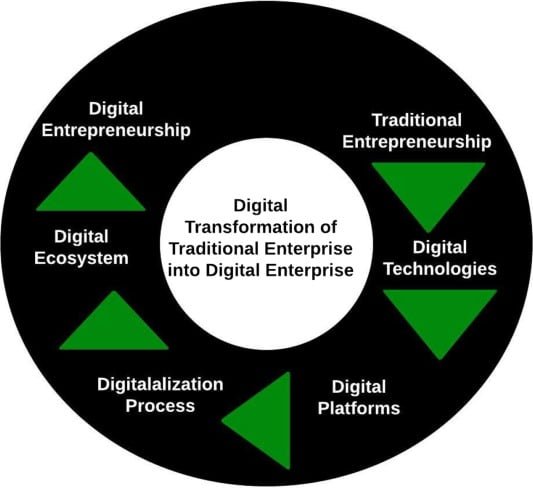
Surely, you have frequently come across calls for entrepreneurship financing competitions, or if you prefer more modern terms, the creation of ‘Startups.’ If you’re thinking about becoming an entrepreneur, you’ve come to the right place to learn some fundamental concepts in this field.
In today’s dynamic and competitive business landscape, the term ‘entrepreneurship’ or ‘entrepreneurial spirit’ has garnered significant attention. Like the heartbeat of innovation and economic growth, entrepreneurship drives the creation of new businesses, fuels job opportunities, and shapes industries, thereby contributing to the economic, social, and environmental development of a region or country.
On the other hand, in recent years, governments have been promoting entrepreneurship as one of the mechanisms to foster economic development, job generation, or address social issues. However, it’s also important to highlight that there is considerable uncertainty in businesses, and a significant percentage of those created end up failing.
The implementation of entrepreneurship deserves priority in development policies because it has been linked to some of the most pressing economic and social issues of our time (Audretsch and Moog, 2022).
What is an Entrepreneurship?
Entrepreneurship refers to the concept of developing and managing a new business with the aim of making profits, in other words, the creation of companies.
The Center for American Entrepreneurship defines entrepreneurship as ‘a process by which individuals or groups of individuals exploit a business opportunity, bringing a new product or process to the market, or substantially improving existing goods, services, or methods of production.’
Reynolds (2005) highlights that ‘entrepreneurship can be conceptualized as the discovery of opportunities and the subsequent creation of a new economic activity, often through the establishment of a new organization.’
In essence, entrepreneurship refers to the process of conceiving, developing, and launching innovative ideas or ventures with the goal of creating value and seizing opportunities in the market. It embodies the willingness to take calculated risks, creatively utilize resources, and adapt to changing circumstances to achieve business success.
As you may have noticed from the previous definitions, entrepreneurship is closely linked to the creation of companies.
Entrepreneurship as a Driver of Economic Growth
Entrepreneurship is often referred to as an entrepreneurial factor, the entrepreneurial function, entrepreneurial initiative, entrepreneurial behavior, and even ‘entrepreneurial spirit’ (Cuervo et al., 2006). Thus, we must consider entrepreneurship as a fundamental element for economic growth.
Bosma et al. (2018) emphasize that the most important channels through which entrepreneurship can lead to economic growth are innovation, the diffusion of innovation, and competition. In this sense, the potential for the integration processes to stimulate economic growth through entrepreneurship is determined by the level of institutionalization of an economy (Sergi et al., 2021).
In this way, innovation involves the introduction of new knowledge into the economy; the diffusion of innovation allows entrepreneurs to identify opportunities in the market; and, finally, the mechanism of competition.
Finally, Cuervo et al. (2006) emphasize the importance of entrepreneurship as an essential element for the progress of an economy, structured in the following manner:
- Identifying, evaluating, and exploiting business opportunities;
- Creating new companies and/or revitalizing and energizing existing ones; and
- Driving the economy – through innovation, competition, job creation – in summary, enhancing societal well-being.
Entrepreneur Characteristics
An entrepreneur is an individual who creates a new business to generate profits, assuming risks and being willing to work for themselves.
However, if you want a more romantic definition, “an entrepreneur is someone who takes action to solve a problem and create a change in the world.” This latter definition includes social entrepreneurs.
Entrepreneurs play a significant role in the economy because they use their skills and initiatives to anticipate needs and bring new ideas to the market.
An entrepreneur is characterized by always being on the lookout for opportunities; according to Eisenmann (2013), these opportunities can involve: 1) pioneering a truly innovative product; 2) conceptualizing a new business model; 3) creating a better or more affordable version of an existing product; or 4) reorienting an existing product toward new customer groups.
Several key characteristics define successful entrepreneurs:
- Innovation: Entrepreneurs thrive on innovation, constantly seeking ways to differentiate their offerings and address unmet market needs.
- Risk-taking: Calculated risk-taking is an integral part of entrepreneurship. Entrepreneurs make informed decisions even when facing uncertain outcomes.
- Ingenuity: Entrepreneurs excel at creatively leveraging available resources, often achieving remarkable results with limited means.
- Persistence: Overcoming challenges and setbacks requires unwavering persistence, a quality deeply embedded in the entrepreneurial spirit.
- Adaptability: The ability to adapt to the changing dynamics of the market and pivot strategies is essential to staying relevant and competitive.
Entrepreneurial Mindset
The entrepreneurial mindset is a crucial factor that distinguishes successful entrepreneurs. It encompasses traits such as creativity, resilience, adaptability, and the willingness to embrace failure as a stepping stone to growth. Entrepreneurs must possess the ability to spot opportunities where others see challenges and steer their strategies based on market feedback.
Various studies have highlighted the importance of education in nurturing an entrepreneurial mindset. In this regard, Larsen (2022) underscores that entrepreneurship education in higher education institutions (HEIs) poses a challenge for educators, as it’s difficult to develop instructional strategies that foster students’ entrepreneurial mindset.
On the other hand, Kuratko et al. (2021) report that three distinct aspects of the entrepreneurial mindset have emerged over the years:
- The Cognitive Entrepreneurial Aspect: how entrepreneurs use mental models for thinking;
- The Behavioral Entrepreneurial Aspect: how entrepreneurs engage or act to seize opportunities; and
- The Emotional Entrepreneurial Aspects: what entrepreneurs feel in the entrepreneurial spirit.
Entrepreneur’s Skills
The entrepreneur is commonly seen as an innovator and creative individual, being a source of new ideas, goods, services, and businesses/methods.
The skills required for an entrepreneur to be successful in their ventures are innovation and the ability to be creative in generating new ideas. In this way, the entrepreneur must have the ability to organize available resources (labor, knowledge, financing, etc.) to generate profits or solve societal problems.
An entrepreneur must possess leadership skills and a strong sense of teamwork to achieve maximum benefit; in other words, the entrepreneur should inspire their team to attain the established outcomes.
In addition to the above, entrepreneurs must be willing to work long hours, anywhere, be curious, and be ambitious.
Importance of Entrepreneurs
Entrepreneurs are key figures in society, as they contribute to:
- Job creation.
- Entrepreneurs innovate.
- Impact on societal and community development.
- Increase in living standards.
- Support for research and development.
How to Promote Entrepreneurship?
There are many reasons to start an entrepreneurial venture, and various factors contribute to its success or failure. While often criticized, certain macro-level factors impacting the entrepreneurial process include culture, religion, trust, financial and educational systems, as well as political and legal institutions.
Several studies have demonstrated that entrepreneurial activities significantly promote economic development (Lv et al., 2021). In this context, researchers emphasize that both formal (constitution, laws, regulations) and informal (norms, habits, social practices) rules play a crucial role in fostering and promoting entrepreneurship.
Governments have been paying considerable attention to entrepreneurial ecosystems: processes and actors within the local social, institutional, and cultural dynamics that encourage and strengthen the formation and growth of new enterprises (Malecki, 2018).
Finally, Lv et al. (2021) report that entrepreneurial education, business plan competitions, and support for entrepreneurial practice positively impact entrepreneurial competency, and that business education enhances the ability to establish a business in the present and engage in entrepreneurial activities in the future.
Barriers Affecting Entrepreneurship Creation
In their research, Tunio et al. (2021) highlight that issues of trust, family barriers, financial concerns, gender issues, educational barriers, corruption, and legal hurdles are among the challenges triggering changes in the entrepreneurial process and its sustainability.
On the other hand, Keikhakohan et al. (2020) report that barriers affecting entrepreneurship creation include economic, educational, psychological, infrastructure, cultural, political, management, technological, human resources, and capital challenges.
Finally, Ferraris et al. (2020) describe how public governments should operate within the context of a smart city to overcome barriers and challenges, fostering an entrepreneurial and innovative ecosystem, along with public-private collaborations. In this regard, Walsh and Winsor (2019) found that sociocultural factors might hinder the region from having a functional entrepreneurial ecosystem that can support innovation.
Types of Entrepreneurships
Here is a classification of entrepreneurial types highlighting their nature and purpose:
Social Entrepreneurships
Social entrepreneurships, also known as social enterprises, is defined as “the practice of addressing social problems through markets” (Mair, 2020); aiming to create social value (Tripathi et al., 2022).
According to Bacq and Lumpkin (2021), social entrepreneurship has long been recognized for its ability to challenge the status quo and navigate interactions with markets, institutions, and governments to make the world a better place.
Research by Kamaludin et al. (2021) identified four key dimensions in social entrepreneurship: social, economic, behavioral, and governance.
Digital Entrepreneurships
Continual advancements in digital technology have led to unprecedented transformation in economic and social activities (Berger et al., 2021), creating a new environment for innovation and business creation.
The concept of Digital Entrepreneurship has been defined as a ‘subcategory of entrepreneurship where part or all of what would be physical in a traditional organization has been digitized’ (Paul et al., 2023).

Berger et al. (2021) and Fossen and Sorgner (2021) highlight that digitization is significantly associated with the ability to undertake individual entrepreneurship and innovation. On the other hand, artificial intelligence, along with Industry 4.0-related technologies, has profound implications for entrepreneurial development (Chalmers et al., 2021).
Finally, Antonizzi and Smuts (2020) mention that by understanding the characteristics of digital entrepreneurship and digital transformation, individuals and organizations can create new commercial ventures or transform existing enterprises by developing new digital technologies or innovatively applying such technologies.
Sustainable Entrepreneurships
Sustainable entrepreneurship has been primarily driven by the demand to achieve sustainability and adopt sustainable business practices to safeguard people, the planet, and profits (Rosário et al., 2022).
According to Rosário et al. (2022), sustainable entrepreneurship prioritizes the balance of economic health, environmental resilience, and social equity to establish opportunities for long-term growth and development.
As a result of their research, Gu and Wang (2022) conclude that:
- Sustainable entrepreneurship promotes regional economic growth.
- There is a positive mediating effect of sustainable entrepreneurship influencing regional economic growth through R&D.
- Financial intermediaries have a positive effect on sustainable entrepreneurship and play a moderating role in the first half of the pathway through which sustainable entrepreneurship affects regional economic growth via technical R&D.
Conclusion
Entrepreneurship has become the key to promoting local, regional, or national development. In this regard, different levels of government should implement policies and programs that foster the ‘entrepreneurial spirit.’
There are various types of entrepreneurship that align with the objectives pursued by the entrepreneur; however, in the present time, these are characterized by being digital and sustainable. Furthermore, you should consider the support programs available for entrepreneurial development.
On the other hand, if entrepreneurship is your goal, it’s important to develop certain skills and capabilities to ensure the success of your venture. You should also take into account the ‘business ecosystem,’ in order to identify opportunities and barriers that exist for entrepreneurship.
Bibliographic References
Antonizzi, J., Smuts, H. (2020). The Characteristics of Digital Entrepreneurship and Digital Transformation: A Systematic Literature Review. In: Hattingh, M., Matthee, M., Smuts, H., Pappas, I., Dwivedi, Y., Mäntymäki, M. (eds) Responsible Design, Implementation and Use of Information and Communication Technology. I3E 2020. Lecture Notes in Computer Science(), vol 12066. Springer, Cham. https://doi.org/10.1007/978-3-030-44999-5_20
Audretsch, D. B., & Moog, P. (2022). Democracy and entrepreneurship. Entrepreneurship Theory and Practice, 46(2), 368-392.
Bacq, S. and Lumpkin, G.T. (2021), Social Entrepreneurship and COVID-19. J. Manage. Stud., 58: 285-288. https://doi.org/10.1111/joms.12641
Berger, E. S., Von Briel, F., Davidsson, P., & Kuckertz, A. (2021). Digital or not–The future of entrepreneurship and innovation: Introduction to the special issue. Journal of Business Research, 125, 436-442.
Bosma, N., Content, J., Sanders, M. et al. Institutions, entrepreneurship, and economic growth in Europe. Small Bus Econ 51, 483–499 (2018). https://doi.org/10.1007/s11187-018-0012-x
Chalmers, D., MacKenzie, N. G., & Carter, S. (2021). Artificial intelligence and entrepreneurship: Implications for venture creation in the fourth industrial revolution. Entrepreneurship Theory and Practice, 45(5), 1028-1053.
Cuervo A., D. Ribeiro y S. Roig. 2006. Entrepreneurship: conceptos, teoría y perspectiva. Introducción.
Eisenmann T. 2013. Entrepreneurship: A Working Definition. Harvard Business Review.
Eryılmaz, Mehmet. (2017). Entrepreneurship. In Khosrow-Pour, M. (Ed.). Encyclopedia of Information Science and Technology, 4 th edition. IGI Global. 10.4018/978-1-5225-7766-9.ch034.
Ferraris, A., Santoro, G. & Pellicelli, A.C. “Openness” of public governments in smart cities: removing the barriers for innovation and entrepreneurship. Int Entrep Manag J 16, 1259–1280 (2020). https://doi.org/10.1007/s11365-020-00651-4
Fossen, F. M., & Sorgner, A. (2021). Digitalization of work and entry into entrepreneurship. Journal of Business Research, 125, 548-563.
Gu, W., & Wang, J. (2022). Research on index construction of sustainable entrepreneurship and its impact on economic growth. Journal of Business Research, 142, 266-276.
Kamaludin, M. F., Xavier, J. A., & Amin, M. (2021). Social entrepreneurship and sustainability: A conceptual framework. Journal of Social Entrepreneurship, 1-24.
Keikhakohan, J., Akbari, M., & Hejazi, S.R. (2020). [Identifying Barriers to Development of Regional Techno logical Entrepreneurship (Case Study: Sarbaz County) (Persian)]. Journal of Rural Research, 11(1), 124-139, http://dx.doi.org/ 10.22059/jrur.2020.292191.1419
Kuratko, D.F., Fisher, G. & Audretsch, D.B. Unraveling the entrepreneurial mindset. Small Bus Econ 57, 1681–1691 (2021). https://doi.org/10.1007/s11187-020-00372-6
Larsen, I. B. (2022). Fostering an entrepreneurial mindset: A typology for aligning instructional strategies with three dominant entrepreneurial mindset conceptualizations. Industry and Higher Education, 36(3), 236–251. https://doi.org/10.1177/09504222211038212
Lv, Y., Chen, Y., Sha, Y., Wang, J., An, L., Chen, T., … & Huang, L. (2021). How entrepreneurship education at universities influences entrepreneurial intention: Mediating effect based on entrepreneurial competence. Frontiers in Psychology, 12, 655868.
Mair, J. (2020). ‘ Social entrepreneurship: Research as disciplined exploration’. In W. W. Powell and P. Bromley (Eds), The Nonprofit Sector: A Research Handbook, 3rd edition. Palo Alto, CA: Stanford University Press, 333–57.
Malecki E. 2018. Entrepreneurship and entrepreneurial ecosystems. Geography Compass. Vol. 12, Issue 3.
Paul, J., Alhassan, I., Binsaif, N., & Singh, P. (2023). Digital entrepreneurship research: A systematic review. Journal of Business Research, 156, 113507.
Reynolds, P.D. 2005. Understanding business creation: Serendipity and scope in two decades of business creation studies. Small Business Economics, 24, 359-364.
Rosário, A.T.; Raimundo, R.J.; Cruz, S.P. Sustainable Entrepreneurship: A Literature Review. Sustainability 2022, 14, 5556. https://doi.org/10.3390/su14095556
Sergi, B.S., Popkova, E.G., Bogoviz, A.V. and Ragulina, J.V. (2019), “Entrepreneurship and Economic Growth: The Experience of Developed and Developing Countries“, Sergi, B.S. and Scanlon, C.C. (Ed.) Entrepreneurship and Development in the 21st Century (Lab for Entrepreneurship and Development), Emerald Publishing Limited, Bingley, pp. 3-32.
Tripathi, M. A., Tripathi, R., Sharma, N., Singhal, S., Jindal, M., & Aarif, M. (2022). A brief study on entrepreneurship and its classification. International Journal of Health Sciences, 6(S2). https://doi.org/10.53730/ijhs.v6nS2.6907
Tunio, M.N.; Jariko, M.A.; Børsen, T.; Shaikh, S.; Mushtaque, T.; Brahmi, M. How Entrepreneurship Sustains Barriers in the Entrepreneurial Process—A Lesson from a Developing Nation. Sustainability 2021, 13, 11419. https://doi.org/10.3390/su132011419
Walsh, J. and Winsor, B. (2019), “Socio-cultural barriers to developing a regional entrepreneurial ecosystem“, Journal of Enterprising Communities: People and Places in the Global Economy, Vol. 13 No. 3, pp. 263-282. https://doi.org/10.1108/JEC-11-2018-0088





